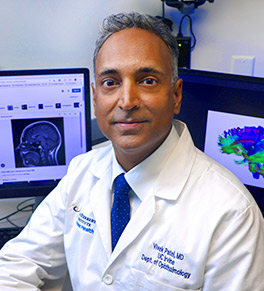
Huntington’s Disease
Huntington’s disease is a genetic disorder that impairs your brain’s nerve cells. Let our movement disorder experts get you symptom relief.
Though Huntington’s isn’t curable, our movement disorder program specialists will help you feel more comfortable.
Signs and symptoms of Huntington’s Disease
Huntington’s is a debilitating and progressive illness that’s usually but not always inherited. The typical age for the onset of motor symptoms is between 35 and 50, although cognitive difficulties can start much earlier.
Motor symptoms are symptoms that affect your balance and how you move. But behavior, mood and personality changes are a major part of this condition. Sudden, different behaviors and shifts in mood occur years before movement disorder symptoms become visible.
For the best care, make sure a neurologist trained in movement disorders, including Huntington’s, evaluates your symptoms. Mood, cognitive and behavioral shifts may resemble well-known psychiatric illnesses, but as Huntington’s symptoms, they need to be treated differently.
Huntington’s symptoms often include:
- Mood swings and psychiatric problems including depression, irritability or personality changes
- Hallucinations
- Involuntary movements of the face, hands, feet and torso known as chorea
- Trouble driving
- Intellectual difficulties, especially with thought, memory, decision-making and focus
- Challenges with talking, swallowing and breathing
- Weight loss or balance problems
Huntington’s disease diagnosis at UCI Health
Although Huntington’s disease is still considered a rare genetic disorder, the number of people afflicted may be higher due to misdiagnosis.
Our doctors may use these tests to pinpoint your diagnosis as appropriate:
- Family history
- Medical history
- Neurologic exam
- Neuropsychiatric evaluation
- MRI brain imaging
- MRI imaging for other areas of the body
- Blood samples for direct genetic testing
During the diagnostic phase, we offer counseling. We find counseling can help you decide whether to get a genetic test and if so, to fully prepare for it. Compassionate counseling can help you navigate your response to the results ahead of time.
Note that at your first appointment, you’ll also meet with a social worker. They’ll help you understand and, if necessary, maneuver through the logistics of employment disability and medical leave.
Family planning when there’s a family history of Huntington’s
Huntington’s disease is progressive and challenging. Some who have a family history and want to start a family come in for a diagnosis. They may then decide not to get the genetic test.
We understand that not getting the test could be the correct decision for you. Know that even if you have the Huntington’s gene, you can still have children through IVF. This could potentially allow you to have children without passing on the gene.
What to do if you have symptoms
If you have chorea symptoms or a loved one has noticed significant mood disturbances, see your doctor. Ideally, your primary care physician will refer you to a neurologist with special movement disorder training.
Our fellowship trained doctors in the UCI Health Parkinson’s Disease and Movement Disorders Program are experts in Huntington’s and all other movement disorders.
Huntington’s disease treatment at UCI Health
Huntington’s disease is relatively uncommon, which makes it essential to choose a doctor with strong diagnostic and treatment experience.
There are no current treatments that halt the progression of this illness. However, there are medications and therapies we use to help you manage your life.
- Medications to calm chorea, uncontrolled movements; antipsychotics to deal with hallucinations; and antidepressants or anti-anxiety drugs
- Physical therapy for balance and coordination
- Occupational therapy to help with everyday tasks
- Speech and language therapy help with communication as well as swallowing and feeding issues
- Psychiatric counseling to strengthen mental and emotional health
- Communication devices such as pictures of everyday items to help clarify communication
How to work with us
If you or someone you know is experiencing unusual behavioral or psychiatric issues or chorea, see a doctor. Or you may not have symptoms but have a family history of Huntington’s and wish to get evaluated. Your primary care physician can refer you to a neurologist.You can always make an appointment to see one of our specialists at the UCI Health Parkinson’s Disease and Movement Disorders Program.
Why choose UCI Health for Huntington’s disease care?
The UCI Health multidisciplinary approach is vital in the care of Huntington’s disease
Many different team members will be involved in your care. This includes: neurologists, psychologists, psychiatrists, social workers, physical therapists and speech therapists.
For example, by having a team with expertise in symptom management, we can reduce the number of falls and accidents. We do driving evaluations and can counsel you about if and when to stop driving. For some, we might be able to help you have fairly mild symptoms for ten or 20 years.
All our doctors are fellowship-trained specialists in movement disorders
We are experienced in caring for people at all stages of Huntington’s disease as well as other rare movement disorders. This is essential because Huntington’s is often underdiagnosed. Many Huntington’s symptoms mimic other disorders, so getting an accurate diagnosis is an important first step.
You’re in excellent hands.
We are a proud member of the Huntington's Disease Society of America’s Centers of Excellence
This non-profit organization is a multinational network of caring professionals. They offer community services, education, advocacy and research to those with Huntington’s. HDSA helps us provide funds to care for underserved people regardless of their insurance status.
Our affiliation with HDSA also allows us to be involved in research and clinical trials.
We are actively seeking new therapies for Huntington’s disease
To support this effort, we are members of the Huntington Study Group. It’s an international consortium of compassionate professionals dedicated to accelerating viable treatment options.
Our research efforts involve scientists, genetic counselors and therapists, as well as our own physicians. We are investigating methods to attack the disease using medications and stem cells.
UCI Health is also home to HDCare, an organization that raises awareness about this illness. HDCare supports research to find a cure and serves the local Huntington’s community.

The right team will improve your quality of life
Don’t let challenging symptoms isolate you from real support.
Reach out for compassionate care from your UCI Health teammates.
Call 714-456-7720 now to speak with a specialist.

Find a neurology clinical trial
Talk to your doctor to see if a neurology clinical trial is right for you.
Featured Blog Posts

Parkinson’s disease: Knowledge is power

UCI Health — Irvine opens its doors

Eyes are a window into the brain
Featured News Stories

Stem-cell therapy is a 'big leap' for Parkinson's treatment
Tardive dyskinesia: A serious side effect of certain medications
UC Irvine-led team discovers potential new therapeutic targets for Huntington’s disease
Upcoming Events
5-6 p.m. +3 more dates
Parkinson's Disease Support Group
The UCI Health Parkinson's Disease Support group provides a place where patients can discuss their diagnosis, treatments, etc.
Parkinsons Wellness Program
5-6 p.m. +3 more dates
Parkinson's Disease Support Group
The UCI Health Parkinson's Disease Support group provides a place where patients can discuss their diagnosis, treatments, etc.




